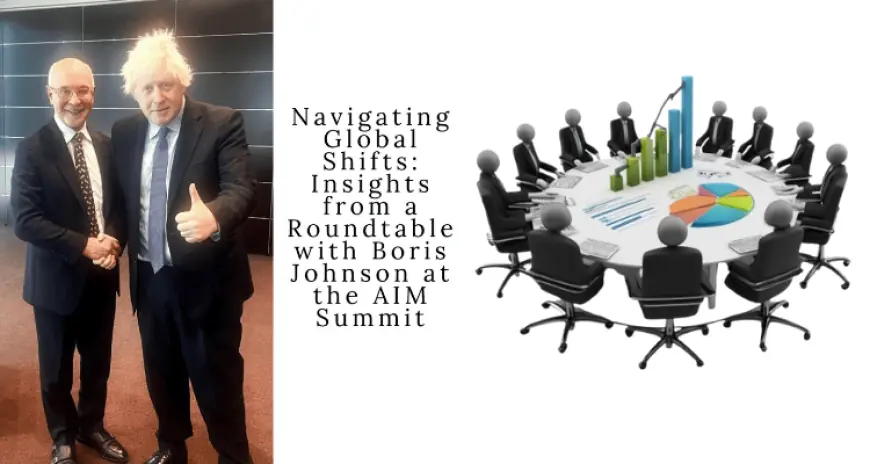Geopolitical Shifts and Leadership Insights from Boris Johnson
Explore geopolitical insights from Boris Johnson and David Gibson-Moore at AIM Summit Dubai. Topics include the Middle East crisis, NATO post-Ukraine, and UK’s post-Brexit foreign policy.
Boris Johnson & David Gibson-Moore Spotlight Global Leadership at AIM Summit Dubai
The AIM Summit Dubai roundtable with David Gibson-Moore and former UK Prime Minister Boris Johnson provided a high-powered platform to discuss the most pressing issues shaping our world. With growing global instability, economic transformation, and evolving power dynamics, the event was timely and impactful.
This landmark conversation delved into Boris Johnson insights on global shifts, geopolitical challenges in the Middle East, and the shifting balance of global security and NATO post-Ukraine war, offering valuable takeaways for governments, businesses, and thought leaders.
Boris Johnson Insights on Global Shifts
Johnson's reflections on global changes were both cautionary and visionary. He emphasized that the 21st century is being shaped by unprecedented technological progress, climate change, demographic shifts, and rising geopolitical fragmentation.
His insights on global shifts painted a picture of a world where Western liberal values must remain resilient in the face of authoritarian rise. He also underlined the need for innovation-led economic recovery and cross-border collaboration on challenges like AI regulation, health security, and climate mitigation.
David Gibson-Moore’s Perspective on Global Shifts
David Gibson-Moore, a respected economist and CEO of Gulf Analytica, brought financial and strategic depth to the discussion. His perspective on global shifts highlighted how emerging markets are not just reacting to global changes—they are actively driving them.
He explained how the Middle East, Asia, and parts of Africa are transforming into strategic centers for investment, energy transition, and technological innovation. These regions are recalibrating global trade routes, forming new alliances, and demanding more influence in multilateral organizations.
Geopolitical Challenges in the Middle East
The speakers gave particular attention to the geopolitical challenges in the Middle East. From civil unrest and failed states to nuclear threats and proxy wars, the region remains in flux. Johnson emphasized diplomacy, cooperation, and development as key to long-term peace.
David Gibson-Moore on the Middle East crisis offered deep economic analysis—suggesting that diversification away from oil, youth empowerment, and regional cooperation (like the Abraham Accords) are critical for sustainable progress.
Global Security and NATO Post-Ukraine War
One of the most pressing issues was the aftermath of the Russia-Ukraine conflict. Both Johnson and Gibson-Moore stressed that global security and NATO post-Ukraine war is undergoing a strategic overhaul.
Johnson, an ardent supporter of Ukraine, stated that the war has reaffirmed NATO’s importance in defending democratic values. He advocated for increased NATO investment, enhanced intelligence sharing, and integrated cyber-defense systems to counter hybrid threats.
Geopolitical Shifts and Global Leadership Insights
The session delivered powerful geopolitical shifts and global leadership insights, focusing on the need for adaptive, ethical leadership in an increasingly fragmented world.
Johnson cited Brexit as an example of reclaiming sovereignty but acknowledged that leadership must also emphasize collaboration and global partnerships. Gibson-Moore emphasized the role of visionary leadership in navigating economic risks like inflation, deglobalization, and digital disruption.
Global Geopolitical Landscape and Future Trends
Looking ahead, both experts discussed how the global geopolitical landscape and future trends will be shaped by multi-alignment rather than the traditional East-West binary. Countries like India, Brazil, Turkey, and Saudi Arabia are asserting their influence and creating new power clusters.
Gibson-Moore warned that institutions must evolve or risk becoming obsolete. He proposed new governance models that include broader representation, faster decision-making, and a global digital governance framework.
Global Britain Vision Post-Brexit
Johnson passionately articulated the Global Britain vision post-Brexit, describing it as a move toward greater autonomy and global engagement. Far from isolationist, Johnson argued that Brexit opens doors for the UK to strengthen bilateral ties, innovate in tech and education, and lead on global issues.
This vision includes new trade deals with the Indo-Pacific, strategic defense partnerships, and an increased presence in regions like the Gulf and Sub-Saharan Africa.
UK’s Foreign Policy and Multilateral Organizations
A central theme was the evolving role of the UK in multilateral organizations such as the UN, WTO, and Commonwealth. Johnson emphasized that while the UK seeks sovereignty post-Brexit, it remains deeply committed to multilateralism to address global crises.
Gibson-Moore stressed reforming these bodies to reflect today's geopolitical realities, ensuring emerging economies have a seat at the table. This, he noted, is essential for addressing climate, debt restructuring, and migration.
Conclusion: Collaborative Leadership in a Multipolar World
The AIM Summit Dubai roundtable with David Gibson-Moore and Boris Johnson was a compelling window into how two influential leaders interpret and shape today’s global narrative.
From the Middle East crisis to the future of NATO, and from post-Brexit Britain's vision to the emergence of a new global order, the discussion emphasized one truth: leadership must be forward-looking, inclusive, and courageous.
As the global geopolitical landscape continues to shift, such dialogues are essential in guiding informed, resilient, and collaborative policies.

What's Your Reaction?
 Like
0
Like
0
 Dislike
0
Dislike
0
 Love
0
Love
0
 Funny
0
Funny
0
 Angry
0
Angry
0
 Sad
0
Sad
0
 Wow
0
Wow
0





















































